Content from the Brookings Doha Center is now archived. In September 2021, after 14 years of impactful partnership, Brookings and the Brookings Doha Center announced that they were ending their affiliation. The Brookings Doha Center is now the Middle East Council on Global Affairs, a separate public policy institution based in Qatar.
The Palestinian response to President Trump’s “deal of the century” was a swift and predictable “no.” After a brief flirtation with Trump and his team more than two years ago, Mahmoud Abbas, chairman of the Palestine Liberation Organization (PLO) and president of the Palestinian Authority (PA), has since characterized the White House’s efforts as a conspiracy to liquidate the Palestinian national movement — a charge he reiterated at the U.N. Security Council on Tuesday.
In the days after the plan’s release on January 28, Abbas called on his people to take to the streets in protest, requested an emergency meeting of the Arab League in Egypt, and sent a letter to Prime Minister Benjamin Netanyahu that threatened to stop all coordination between the PA and Israel, including on security.
The details of the plan largely validate Abbas’ fears. Trump’s “vision,” as it’s called, hews very closely to the positions espoused by Israel’s ideological far-right, even adopting its language and narratives, such as using Biblical references to justify Israeli political control of Jerusalem. A Palestinian state, if it’s allowed to come into existence, will be in name only, stripped of all meaningful elements of sovereignty, and situated in an archipelago of ghettoized enclaves that resemble the Bantustans of apartheid-era South Africa. Israel would retain more than 30% of the West Bank, all its settlements, and the entirety of Jerusalem, as well as complete control over Palestine’s security, territorial air and waters, borders, and even treaties and alliances. So restricted is Palestinian autonomy that the new “state” would even have to ask Israeli permission to build a well because groundwater rights remain in Israel’s hands.
In another word, the plan is a farce. But even so, the real threat to liquidate the Palestinian national movement doesn’t come from Israel or the United States, but from the failure of its leadership. Indeed, Trump’s presidency has laid bare the fundamental weakness of Palestinian politics, the passivity of its leaders, and the dire state of its institutions after more than a quarter-century of peace processing and the fiasco of the Oslo Accords.
A string of setbacks
From the time of the British Mandate in Palestine to the regeneration of the national movement under the Yasser Arafat-led PLO to today, Israel has largely opposed Palestinian national aspirations, with the U.S. usually a willing ally in the effort to obstruct. Nonetheless, the national movement didn’t simply disappear — it persisted, and overcame many challenges and setbacks along the way.
Although Israel ultimately recognized the PLO as the legitimate representative for Palestinians in 1993 with the signing of the Oslo Accords, it did not then accept the Palestinians’ right to self-determination in a sovereign state of their own. Rather the Oslo Accords reflected the limit of what Israel was willing to agree to at the outset of negotiations: for a de-nationalized Palestinian entity to assume local governance in the West Bank and Gaza Strip, relieving Israel of most of its obligations as a military occupier while allowing it to exercise sovereignty over the entire territory. And with no shared basic assumption of where negotiations would lead, or any legal terms of reference, the ultimate breakdown of the accords turned this interim agreement into an indefinite situation. Furthermore, this is essentially what the Trump plan would permanently enshrine if implemented.
Yet for more than two years, while Trump’s team orchestrated one policy initiative after another aimed at either consolidating Israeli control over occupied territory — including Jerusalem — or undermining Palestinian positions, Abbas and his inner-circle of have done little but issue worn-out slogans. Instead of proactively countering the impending proposal by, at the very least, proffering an alternative vision and working with allies in the region and beyond to build support for it, the Palestinian leadership has sat back on its heels and waited without developing a cogent strategy or vision.
Israel knows that Abbas’ threats to end PA coordination or disband the PA altogether are not realizable. That would have required — at some point over the past 15 years — building the necessary alternatives to Oslo-era structures, which relieve Israel of governing responsibilities while reinforcing Palestinian dependence for everything from water and electricity to ports and permits. As such, ad hoc maneuvers like the recent PA decision to ban the import of certain Israeli products to Palestinian markets may be effective in principle, but Palestinians are woefully unprepared for the trade war that is likely to result from them. Extricating Palestinians from this bind without tremendous risk to their well-being is a task beyond this leadership’s competency.
Instead of seeking a way out of the Oslo imbroglio, Abbas has dug in deeper, becoming more reliant on Israeli and American goodwill in order to advance the cause of Palestinian statehood. Rather than strengthening meaningful relationships abroad, including among the Palestinian diaspora, his strategy has been to hold out for a paradigm shift to occur inside Israel or America, which might rescue the two-state solution. It is because of this overwhelming dependence that Israel and America are in a position to inflict such immense damage to the movement.
It is because of this overwhelming dependence that Israel and America are in a position to inflict such immense damage to the movement.
Certainly the Palestinian leadership will find comfort in the Arab League’s unanimous decision to reject the Trump proposal, which dashed the administration’s hopes that it would garner support for its vision in the wider region. This was followed days later by a resolution from the Organization of Islamic Cooperation, which called on its 57 members “not to engage with [the] plan or cooperate with the U.S. administration in implementing it in any form.”
Yet these positions bely important shifts in the Middle East on the Palestinian question and relations with Israel. New geopolitical realities, including regional turmoil, the perceived threat of Iranian expansionism, and American retrenchment, have brought Israel and some Arab countries closer together. Moreover, how can one expect the Arab states to indefinitely refrain from pursuing common interests with Israel when the PA cooperates with Israel on a daily basis? Surely, Abbas can’t ask them all to be more Catholic than the Pope.
Connected to this is the broader Arab public and its zeal for the Palestinian cause, which has traditionally acted as a check on regional leaders. In recent years this passion has waned, in part because other, more urgent issues have taken priority, but also because the Palestinians’ unremarkable, blinkered, and aging leadership has done little of late to galvanize regional public opinion. (It only took the exploit of one teenage girl, Ahed Tamimi, confronting an Israeli soldier in 2017 to show how acts of resistance can capture the global imagination.)
The same is true at home where Abbas’ own popularity and credibility have eroded due to a lack of progress on statehood, poor governance in general, a suspension in democratic elections, and a willingness to maintain security coordination with Israel. In place of a legitimate mandate, he has increasingly relied on instruments of suppression to stay in power. In the process, he has silenced critics, stifled constructive debate, and demobilized the public, so that there are almost none of the structures in place that allowed Palestinians to previously challenge Israel’s occupation.
Where the PLO could once be considered a legitimately representative — though never democratic — body, efforts to consolidate control of the institution have reduced it to a shell: Refugee and diaspora populations have been severed from the political process; the large portion of Palestinian society affiliated with Islamist factions, such as Hamas, are not included under the PLO umbrella; and the remaining factions have lost much of their former relevancy.
No substitute for political leadership
The state of Palestinian affairs should be a concern to all, no matter their political background. It is that weakness that has allowed Israel to press its advantage to the fullest, which is arguably at the root of failed peacemaking efforts. And if at some point in the future Israel decides it is in its best interest to strike a deal with Palestinians, there will be no party on the other side legitimate enough to sign a meaningful, lasting agreement. Palestinian weakness has also allowed those Israelis more interested in total Palestinian capitulation to seize the initiative, which has brought Israel closer to annexation and apartheid, as well as the binational reality many Israelis fear most.
A grassroots campaign…may be a powerful mechanism for change, but is not a substitute for a coherent political program driven by political actors.
Still, as long as Palestinians are denied political and civil rights, the conflict will live on, deteriorate, and create more instability. And while the current Palestinian leadership has weakened the national movement, it still has many assets from which to build on: Palestinian identity remains as robust and widespread as ever; Palestinian activists, civil society, and their supporters, including among Israeli and Jewish groups, at the grassroots level is the most dynamic and inspiring component of the national movement; a fresh generation of academics and scholars are providing a new intellectual framework for understanding the conflict that the grassroots is using to orient their struggle; and the daily injustices Palestinians face remain a constantly-replenishing well from which to draw justification and energy for their cause.
Yet a grassroots campaign — such as Boycott, Divestment, Sanctions (BDS), which was launched in 2005 as a means to pressure Israel in the face of the failure of state actors to resolve this conflict — may be a powerful mechanism for change, but is not a substitute for a coherent political program driven by political actors.
The only future the Palestinian national movement has is if the current leadership moves out of the way, or is pushed aside, to give others a chance to lead.
The Brookings Institution is committed to quality, independence, and impact.
We are supported by a diverse array of funders. In line with our values and policies, each Brookings publication represents the sole views of its author(s).

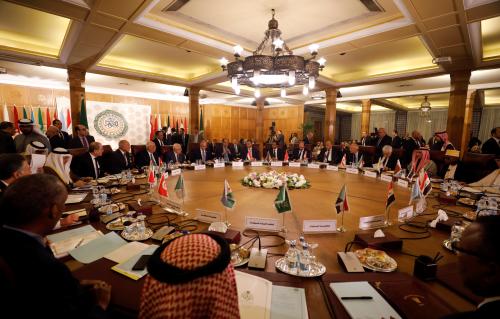
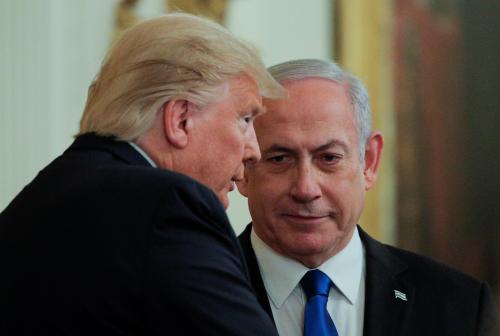
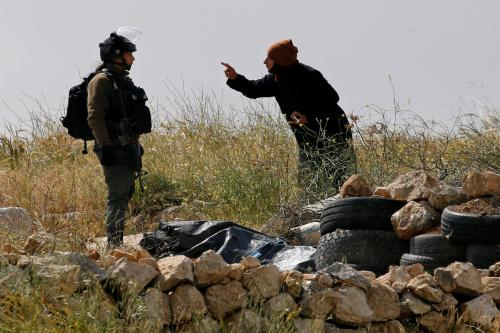

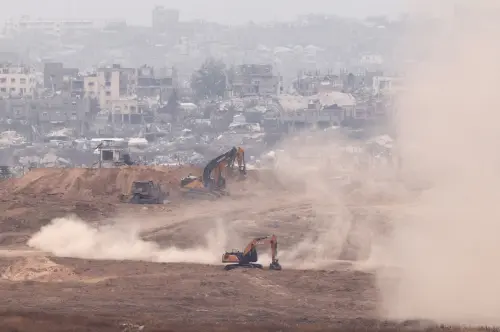
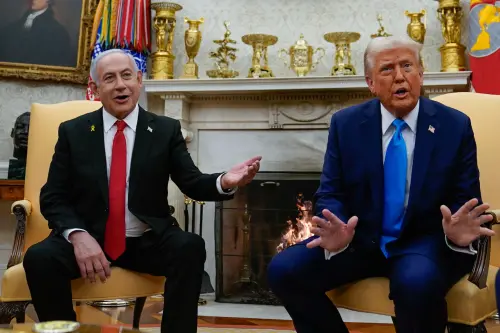
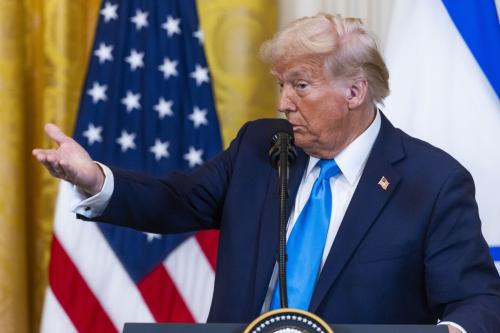
Commentary
The real threat to Palestine is a crisis of leadership
February 13, 2020